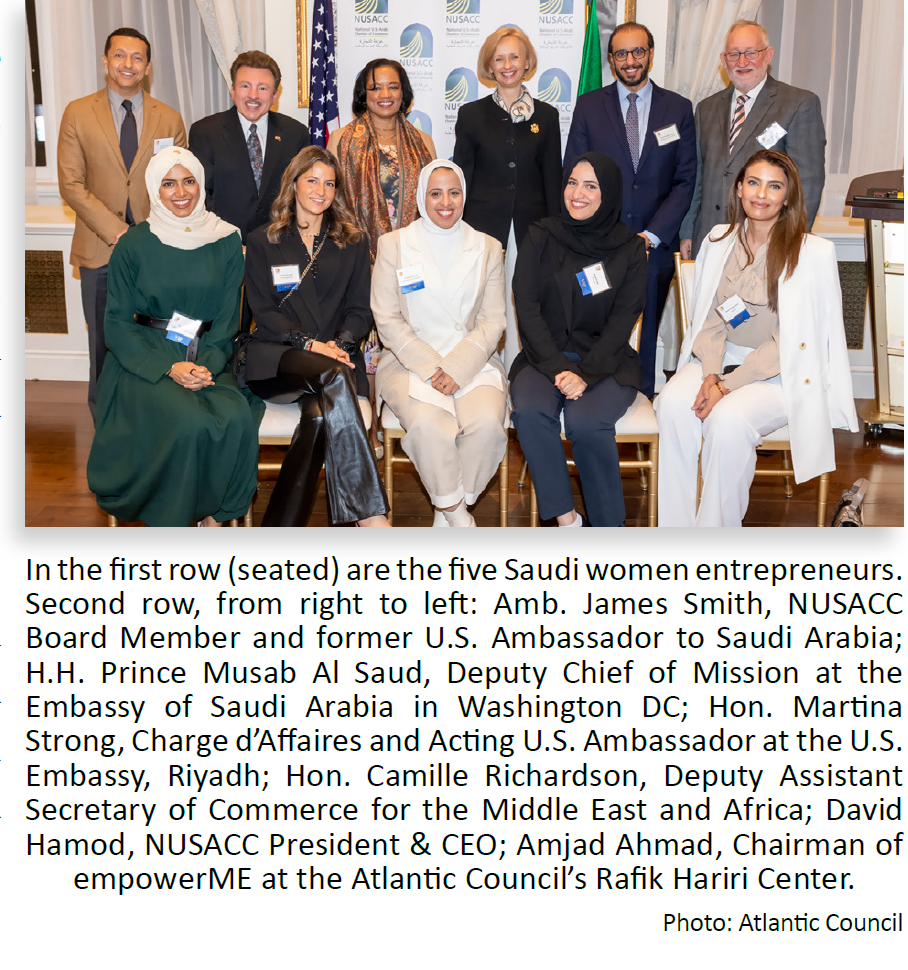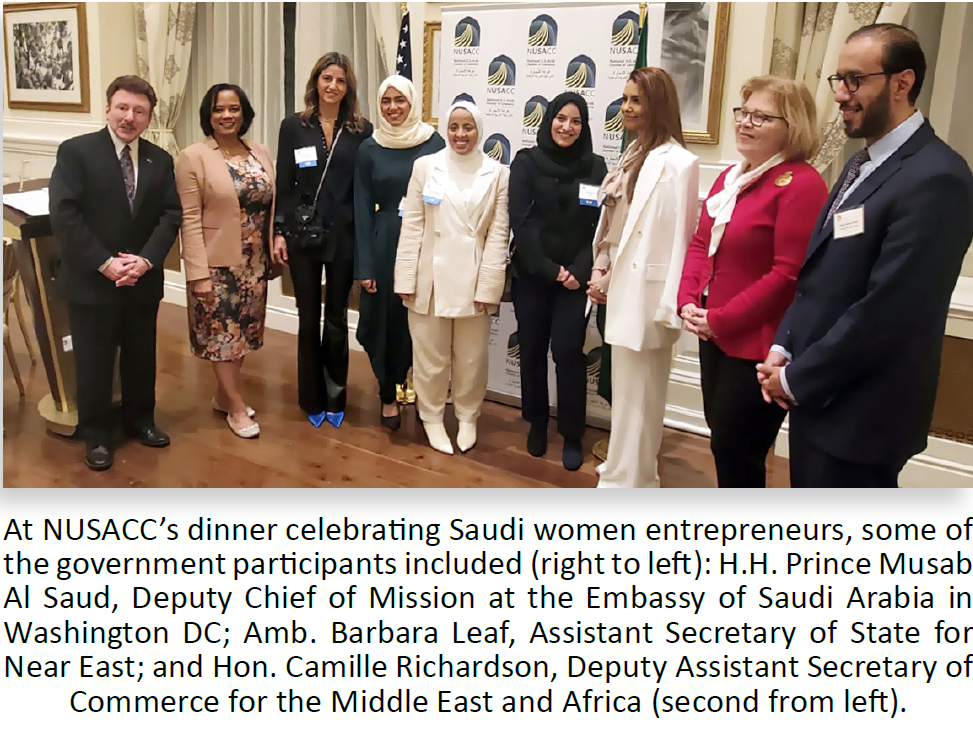NUSACC Supports Saudi Women Entrepreneurs
Women Innovators (WIn) Initiative Helps Entrepreneurs to Upscale Their Start-Ups
In Keeping with International Women’s Day, NUSACC Hosts High-Level Working Dinner for 40 Government and Business Leaders
This past week, as part of its commitment to International Women’s Day, the National U.S. – Arab Chamber of Commerce (NUSACC) hosted a dinner celebrating Saudi women entrepreneurs. The cohort of 33 women, represented by five of its leading entrepreneurs, visited Washington DC and New York City for training and the opportunity to gain firsthand insights from U.S. Government officials and American business leaders.
“Women entrepreneurs are reshaping the commercial landscape in Saudi Arabia,” noted David Hamod, NUSACC’s President & CEO, “and our Chamber is proud to support the empowerment of these future leaders.”
The Saudi entrepreneurs are part of the Women Innovators (WIn) Fellowship, which was launched in March 2022 by the Atlantic Council’s empowerME initiative in partnership with the U.S. Embassy in Riyadh, Pepsico, UPS, and Georgetown University (which hosted a week-long road show in Washington DC and New York City).
Sponsors of the NUSACC dinner included the Royal Embassy of Saudi Arabia (Lead Sponsor) and the Pharmaceutical Research and Manufacturers of America (PhRMA), a Gold Sponsor.

Dinner Fare: Practical Business Advice
NUSACC’s dinner for 40 public sector and private sector leaders was held at the historic Waldorf Astoria Hotel in Washington DC. The gathering provided an opportunity to share “real-world” stories about opportunities and pitfalls for start-ups and well-established companies.
Some of the attendees included: Hon. Martina Strong, Acting U.S. Ambassador at the U.S. Embassy, Riyadh; H.H. Prince Musab Al Saud, Deputy Chief of Mission at the Embassy of Saudi Arabia in Washington DC; Amb. Barbara Leaf, Assistant Secretary of State for Near Eastern Affairs; Hon. Camille Richardson, Deputy Assistant Secretary of Commerce for the Middle East and Africa; Amb. Salah Sarhan, Chief Representative of the Arab League Mission in the USA.
“All of you entrepreneurs are disruptors in a positive way,” said Amb. Barbara Leaf. “You are pioneers and leaders, and you will be role models for the next generation. Little girls in Saudi Arabia will look up to you, thinking, ‘I can be just like her’.”
Deputy Assistant Secretary Camille Richardson noted, “We are here tonight to recognize five brilliant entrepreneurs, whom I will call the ‘Fab Five’ because they are fabulous. They are a reflection of modern Saudi society and how far the Kingdom has come in such a short period of time.”
Richardson concluded, “I look forward to seeing what happens over the next year with the ‘Fab Five’ so that when we get back together, we can see what a difference a night like this can make.”
High-level business executives from multiple commercial sectors participated in the dinner, which included former U.S. Ambassadors. One of these, Hon. James Smith, is a NUSACC Board Member and former U.S. Ambassador to Saudi Arabia.
“I’ve watched in awe since I first went to Saudi Arabia in 2009 at the amazing energy of young women entrepreneurs,” Smith said. “The incredible women we met at the NUSACC dinner are a reflection of the tremendous contribution that women are making to the positive transformation of their country.”
Snapshots of the Entrepreneurs
The visit to Washington DC and New York City revolved around five remarkable Saudi women entrepreneurs:
- Meyce Alauddin, Founder and CEO, The Giveaway Co
- Dr. Rawan Al-Kharboosh, Founder and CEO, AtPoint tx
- Renad Aljefri, CEO, Ad Astra
- Sumayah Alzamil, Co-Founder and CEO, Nugttah
- Sara Binladen, CTO, Quantum
Meyce Alauddin is the Founder and CEO of The Giveaway Co., a customized luxury giveaway company that was founded seven years ago in Jordan and has since grown to serve corporations and celebrate personal occasions around the world. To date, the company has serviced over 3,000 events in 13 different countries.
Dr. Rawan Al-Kharboosh is the Founder and CEO of AtPoint tx, a biotech and life-science company specializing in space medicine and stem cell engineering for point-of-care applications. Dr. Rawan believes in the possibility of patients becoming self-repairing by using their own stem cells to replenish and restore cells that have experienced permanent damage.
Renad Al-Jefri is the CEO of Ad Astra, a platform aimed at creating jobs in the special needs therapeutic industry. Ad Astra also helps to improve the quality of life for people with special needs and their families.
Sumayah Alzamil is the founder of two tech startups in Saudi Arabia. The first is IntelCodes, which has provided software development support services since 2017. The second is Nugttah, which offers customer engagement and data services to small and medium-sized businesses in Saudi Arabia’s food and beverage sector.
Sara Binladen is a tech enthusiast, data analyst, and business leader who started a web development company in 2012 and co-founded an e-commerce business in 2016 that creates distinctive jewelry. She then became Chief Technology Officer at Quantum Platform, a technology company that helps e-commerce companies unlock their media potential.
Overview of the WIn Program
The Women Innovators (WIn) Fellowship was launched by the Atlantic Council’s empowerME initiative to support women entrepreneurs in building leadership and executive capacity and in scaling their startups. The goals of the Fellowship include:
(1) Accelerating the leadership and executive skills of women entrepreneurs and providing them with an unparalleled network of mentors, business executives, and policymakers;
(2) Exposing U.S. policymakers, scholars, and business leaders to a unique perspective on women’s opportunities and challenges in Arab world countries; and
(3) Developing a top-tier network of WIn Fellows across the MENA region who can support one another and serve as ambassadors for women’s economic participation.
Collaboration between the Atlantic Council and Georgetown University provides a year-long program that includes: A tailored executive education program offered by Georgetown University McDonough School of Business; mentoring and networking opportunities with leading American and Arab experts and business executives; and workshops with subject matter experts to advance government and business policies that increase women’s economic participation.
The inaugural program was launched in Saudi Arabia with support from the U.S. Embassy in Riyadh, PepsiCo, and UPS, as well as the American Chamber of Commerce in Saudi Arabia. The inaugural program included over 30 Saudi women entrepreneurs and 35 mentors from such companies as Careem, Mastercard, Pepsi, Majid El Futtaim, and Boeing, among others.

empowerME Perspective
Female entrepreneurs in the MENA region have made remarkable strides in recent years, despite socio-economic and cultural obstacles. According to the empowerME Initiative at the Atlantic Council, one out of every three tech companies in the Arab world has a female leader, which represents a higher percentage than that of California’s Silicon Valley.
The potential of Arab businesswomen is significant, yet it remains underutilized because of certain legal, financial, and social barriers. Supporting and promoting entrepreneurship among women, according to the Atlantic Council, can create more job opportunities, boost economies, and help to reduce poverty. According to the Organization for Economic Cooperation and Development (OECD), the MENA region is losing an estimated $575 billion annually because impediments are holding back women business leaders.
Increasing female entrepreneurship leads to more inclusive, prosperous, and equal societies. In the words of the Atlantic Council, “To fully leverage the economic and social benefits of increased female entrepreneurship, policymakers must take steps to establish an enabling environment for these women to prosper and grow.” The WIn Fellowship is designed to do just that.
A Chamber Perspective
The NUSACC dinner celebrated Saudi women entrepreneurs. In the words of David Hamod, NUSACC’s President & CEO: “We know the value of entrepreneurship and its contributions to transformation and job creation. We also know the value of women business owners and their contributions to a nation’s commerce. Tonight, we bring those together under one roof.”
Saudi Vision 2030, a “blueprint” for the Kingdom, has established a goal to create one million jobs for women by the year 2030. In that spirit, Saudi Arabia has the third-highest percentage worldwide of women holding entrepreneurial roles, according to a report by London-based Global Entrepreneurship Monitor (GEM), which studied 43 countries.
That same report also found that start-ups launched by women in Saudi Arabia are essentially on par with start-ups launched by Saudi men. This suggests that the business culture of the Kingdom is changing, opening the door to greater participation by businesswomen.
“It takes guts to start a new business,” noted Hamod. “One needs a strong appetite for risk, and one cannot fear failure. This last point – fear of failure – may be the most challenging aspect for all of us.”
Hamod cited Thomas A. Edison, widely regarded as America’s greatest inventor. Edison once said, “I have never failed. I’ve just found 10,000 ways that won’t work.”
“In other words,” Hamod suggested, “what sometimes feels like failure may, in fact, be an opportunity.”
He concluded, “Tonight, we are getting a glimpse of the future of Saudi Arabia. Women have always done great things. And Saudi women have always done great things. But when they have a platform like the WIn program supporting them, they will do even greater things.”

Parting Words
The Embassy of Saudi Arabia served as Lead Sponsor for the dinner. H.H. Prince Musab Al Saud, Deputy Chief of Mission, noted, “The women entrepreneurs here today represent the immense talent and thriving business ecosystem in the Kingdom. It is an ecosystem that represents the key principles of Vision 2030 with inclusion at its core.”
PhRMA served as the Gold Sponsor of the dinner. Mr. Samir A. Khalil, a NUSACC Board Member, serves as PhRMA’s Executive Director for Middle East & Africa, based in Dubai, UAE.
“PhRMA is distinguished by our R&D and innovation,” said Khalil, “and these are essential for entrepreneurs. I’m pleased and honored that we could help these Saudi women entrepreneurs with their respective journeys as young professionals.”
Amjad Ahmad, Chairman of the empowerME program at the Atlantic Council’s Rafik Hariri Center, noted that this week’s WIn Fellowship road show represented a “fantastic opportunity for our fellows to connect with influential government officials, business leaders, and policymakers to exchange ideas and network. The NUSACC dinner provided an excellent platform to discuss the economic and social change in Saudi Arabia and how to build more business opportunities between the U.S. and Saudi Arabia.”
Ahmad concluded, “I highly appreciated NUSACC’s support of the WIn Fellowship and the Chamber’s efforts in hosting a very memorable event.”
Click here to view the report in PDF.
Visit our blog here!







